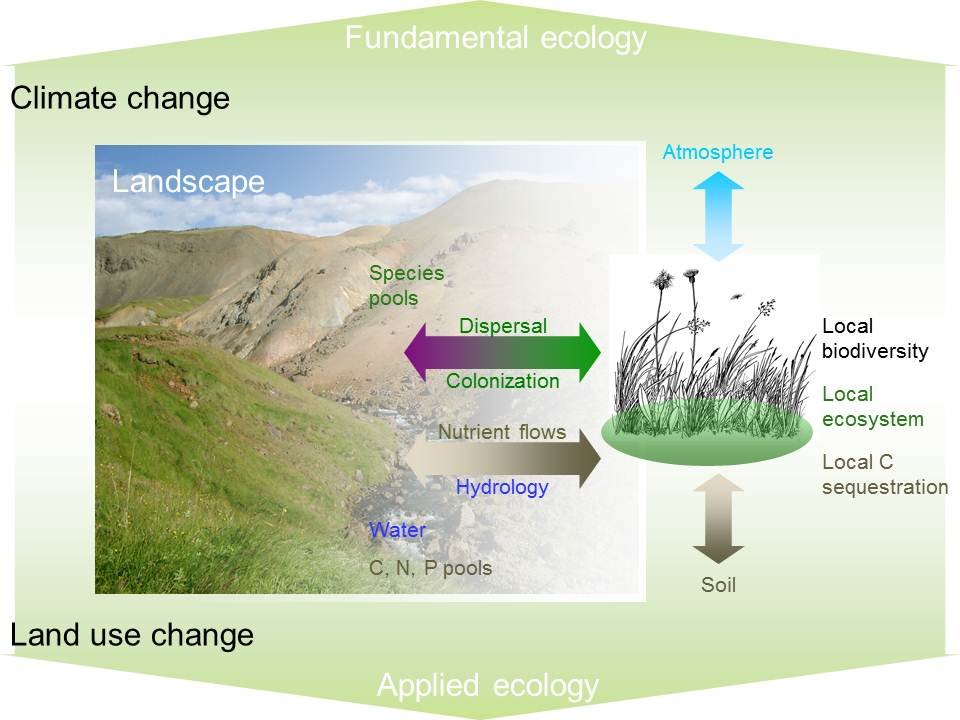Research

Research: from community assembly to ecosystem management
The regulation and functioning of biodiversity are key issues in fundamental ecology, but they are also taking on an increasingly urgent societal dimension. Human impacts are currently resulting in extraordinarily high rates of ecosystem modification and species extinctions. These alterations of natural systems may have strong negative effects on basic ecosystem functions that are crucial for human wellbeing, such as climate change mitigation, hydrological services and disease regulation. This leads to an urgent need to understand the fundamental processes that determine biodiversity, as well as the relation between community composition, species diversity and basic ecosystem functions.
The Ecology & Biodiversity Group investigates the ecological mechanisms that regulate biodiversity and the ecosystem services provided by living communities in interaction with atmosphere, water and soil. We have developed a multidisciplinary research framework aimed at unraveling, identifying and quantifying the factors that determine community assembly, involving both the movement of organisms (dispersal) and subsequent environmental filtering. We then assess how community composition and biodiversity predict ecosystem services such as carbon sequestration, water safety, plant growth and disease suppression. We take an integrated approach considering above- and belowground species interactions toward identifying how, and to what extent, different components of biological diversity are regulated and how changes in any component impact ecosystem functions. We use a combination of laboratory, phytotron, greenhouse and field experiments, long-term field monitoring and modelling across a range of ecological, spatial and temporal scales. We pay special attention to the movement of organisms and above- and belowground species interactions, from the 'micro' to the landscape scale.
Our group’s mission is to understand and predict biodiversity and ecosystem functioning in a changing world, with special focus on impacts of changing climate, land use and hydrology. We apply the results of our studies to assess impacts of global change and provide guidelines for ecosystem management and restoration and species conservation. As such, the group’s research spans the range from purely fundamental to strategically applied. Our research is embedded in Utrecht University’s strategic theme Sustainability, and focus area’s Future Food and Future Deltas. Also, our group is part of Utrecht University’s Academy of Ecosystem Services and host of the Prince Bernhard Chair for International Nature Conservation.
Main research lines
Our research focusses on three main levels of ecological organization: (1) rules of community assembly, (2) drivers of ecosystem functioning, and (3) prediction of future ecosystem responses.
Key publications
- Vos M, Wolf AB, Jennings SJ & Kowalchuk GA (2013) Micro-scale determinants of bacterial diversity in soil. FEMS Microbiology Reviews 37: 936–954.
- Soons MB & Bullock JM (2008) Non-random seed abscission, long-distance wind dispersal and plant migration rates. Journal of Ecology 96: 581-590.
- Hefting MM, Van den Heuvel RN & Verhoeven JTA (2013) Wetlands in agricultural landscapes for nitrogen attenuation and biodiversity enhancement: Opportunities and limitations. Ecological Engineering 56: 5-13.
- Jousset A et al. (2013) Evolutionary history predicts the stability of cooperation in microbial communities. Nature Communications 4:2573.
- Van Kuijk M, Anten NPR, Oomen RJ & Schieving F (2014) Stimulating seedling growth in early stages of secondary forest succession: a modelling approach to guide tree liberation. Frontiers in Plant Science 5: article 345
- Hautier Y, Tilman D, Isbell F, Seabloom EW, Borer ET, Reich PB (2015) Anthopogenic environmental changes impact ecosystem stability via biodiversity. Science 348: 336-340

